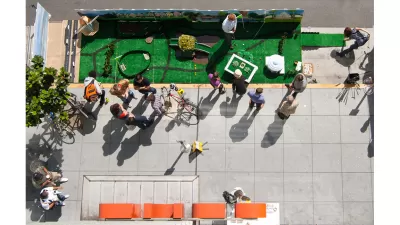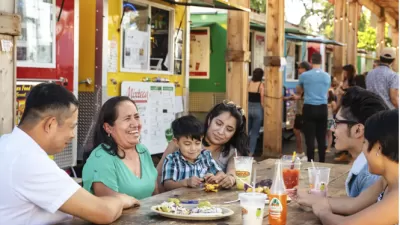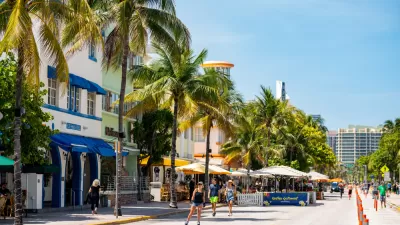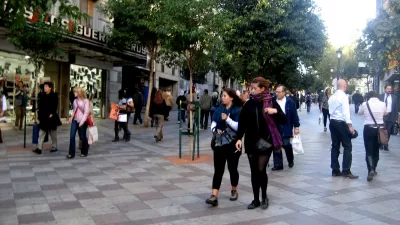COVID-19 restrictions have highlighted the importance of abundant, multi-use open spaces accessible to all.

Of the many profound changes experienced by cities in 2020, writes John King, the most meaningful might be the "realization of the importance of public space in all its forms, as well as heightened expectations of what such spaces should provide." From public seating to pocket parks to vast open spaces, the restrictions on indoor(and many outdoor) activities highlighted the need for safe, accessible, and abundant public spaces.
"In a July survey conducted by the East Bay Regional Parks District, more than 20% of the respondents said they visit one of the district’s 73 parks 'weekly,' four times the amount recorded in 2019." Public spaces also took on unexpected uses, including parking lots transformed into dining spaces, vacant lots turned into COVID-19 testing sites, and parks used to distribute free food and necessities. Phil Ginsburg, general manager of San Francisco’s Recreation and Park Department, told the San Francisco Chronicle, "parks are not luxuries or sweet amenities — they’re essential infrastructure."
But some warn against "knee-jerk" reactions from city planners and officials who assume, for example, that restrictions on cars are "an absolute good." Oakland's Slow Streets program received such criticism for its expedited implementation and lack of adequate public outreach. Oakland architect June Grant argues that plans must be made at the neighborhood level, where local users know how they use their local roads and public spaces. Ryan Russo, director of Oakland’s Department of Transportation, admits that the city's policies have often failed to reflect the experiences of underrepresented communities. "It’s too easy to listen to voices that reflect your own experiences. We need to stay in conversation with the community."
FULL STORY: As we kept space from one another, our public spaces revealed their new uses

Planetizen Federal Action Tracker
A weekly monitor of how Trump’s orders and actions are impacting planners and planning in America.

Chicago’s Ghost Rails
Just beneath the surface of the modern city lie the remnants of its expansive early 20th-century streetcar system.

San Antonio and Austin are Fusing Into one Massive Megaregion
The region spanning the two central Texas cities is growing fast, posing challenges for local infrastructure and water supplies.

Since Zion's Shuttles Went Electric “The Smog is Gone”
Visitors to Zion National Park can enjoy the canyon via the nation’s first fully electric park shuttle system.

Trump Distributing DOT Safety Funds at 1/10 Rate of Biden
Funds for Safe Streets and other transportation safety and equity programs are being held up by administrative reviews and conflicts with the Trump administration’s priorities.

German Cities Subsidize Taxis for Women Amid Wave of Violence
Free or low-cost taxi rides can help women navigate cities more safely, but critics say the programs don't address the root causes of violence against women.
Urban Design for Planners 1: Software Tools
This six-course series explores essential urban design concepts using open source software and equips planners with the tools they need to participate fully in the urban design process.
Planning for Universal Design
Learn the tools for implementing Universal Design in planning regulations.
planning NEXT
Appalachian Highlands Housing Partners
Mpact (founded as Rail~Volution)
City of Camden Redevelopment Agency
City of Astoria
City of Portland
City of Laramie





























